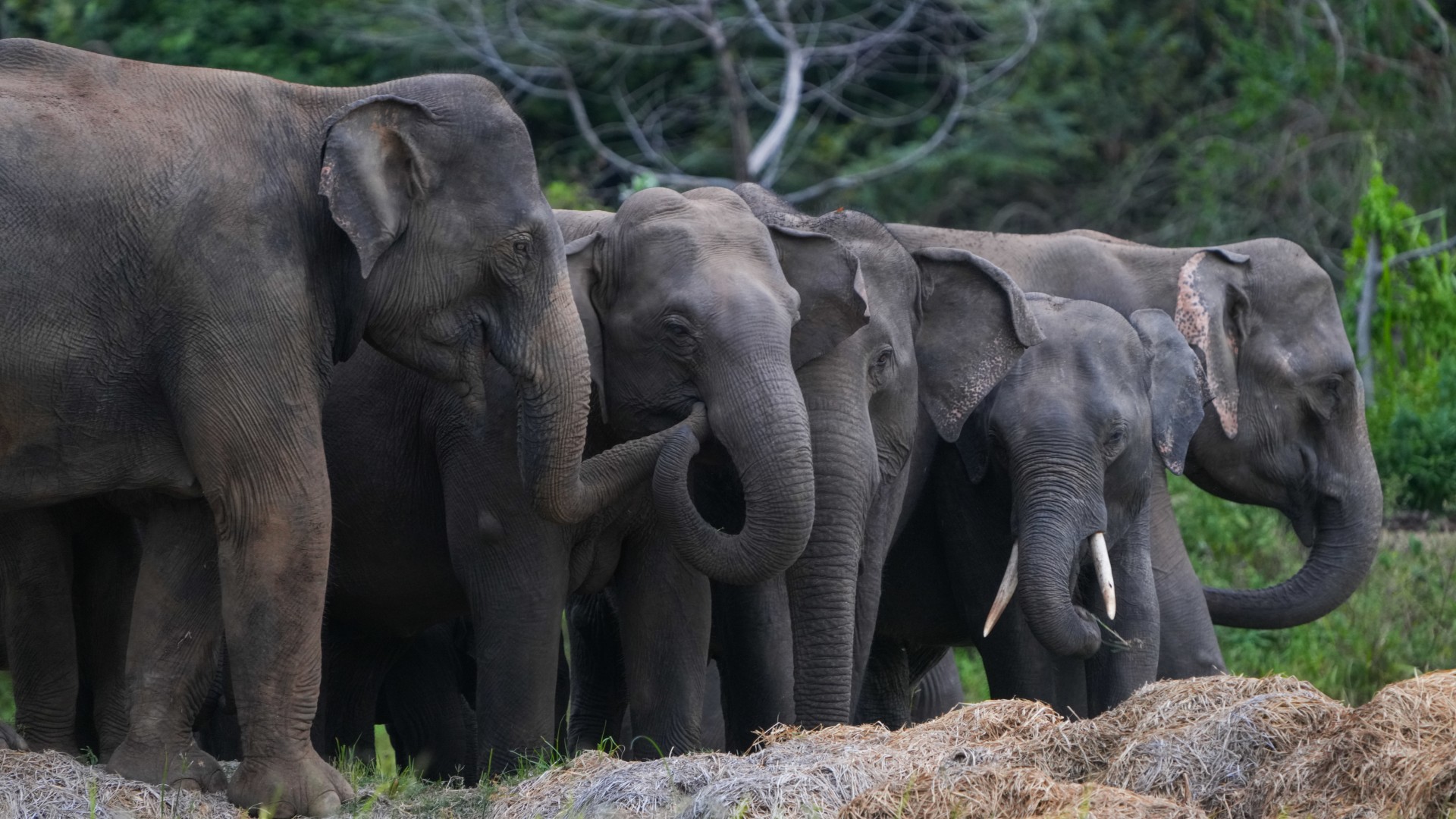Animals and their understanding of death
A new scientific discipline promises to bring us closer to knowing how different species react to dying

A free daily email with the biggest news stories of the day – and the best features from TheWeek.com
You are now subscribed
Your newsletter sign-up was successful
What do animals know about death? It's a question Charles Darwin himself pondered. "Who can say what cows feel, when they surround and stare intently on a dying or dead companion?" the biologist wrote.
But for much of the 20th century, many scientists didn't believe animals understood the difference between life and death. "Monkeys and apes do not recognize death, for they react to their companions as if the latter were alive but passive," wrote the primatologist Solly Zuckerman in 1932.
Since then, however, there has been a shift in thinking and the emergence of a new scientific discipline of comparative thanatology – the study of how animals and people respond to death and dying.
The Week
Escape your echo chamber. Get the facts behind the news, plus analysis from multiple perspectives.

Sign up for The Week's Free Newsletters
From our morning news briefing to a weekly Good News Newsletter, get the best of The Week delivered directly to your inbox.
From our morning news briefing to a weekly Good News Newsletter, get the best of The Week delivered directly to your inbox.
Are animals aware of death?
In 2010, scientists documented the death of an elderly chimpanzee. They observed behaviours from those in her troop that suggested an awareness of death, such as pre-death care, testing for life signs and avoidance of the place where the chimp died.
Some experts, like James Anderson, believe the behaviour indicated that animals like chimpanzees are more aware of death than we think. "Without death-related symbols or rituals, chimpanzees show several behaviours that recall human responses to the death of a close relative," wrote Anderson and his colleagues at Kyoto University. "Are humans uniquely aware of mortality? We propose that chimpanzees' awareness of death has been underestimated."
Do animals understand death?
Human children learn between the ages of four and seven that death is not a temporary or reversible state. According to a 2004 paper in the journal Cognition, children understand death as "a permanent loss of agency".
Philosopher Susana Monsó suggested that many animals are likely to share this basic understanding of death, though proving it is difficult. Many species, including mammals, birds and insects, seem to display behaviours indicating awareness of movement and agency. "And some of them behave in ways that suggest an understanding that other animals can lose this agency forever," said Ross Andersen in The Atlantic. "The hard part is knowing whether these behaviours flow from a conceptual recognition of death, or if they're simply instincts."
A free daily email with the biggest news stories of the day – and the best features from TheWeek.com
Do animals know when they're going to die?
Again, the idea that animals might sense their impending death is difficult to prove. Scientists can measure physical indicators like hormonal changes. For example, baboons exhibit spikes in cortisol – a stress hormone – when a close companion dies. But interpreting such data is complex because other stressors could cause similar hormonal responses.
As is common in human observations of death, "terminal lucidity" – a burst of energy and clarity shortly before death – seems common in animals. The so-called "last rally" could have an "evolutionary benefit", said biologist Dr Rupert Sheldrake on Mail Online. "In the wild, an animal that instinctively knows it is dying can detach itself from the pack and take itself away, to go somewhere its corpse won’t spread disease."
Do animals have rituals around death?
Many animals appear to display ritualistic behaviours towards their dead. Elephants gather around deceased members of their herd, sometimes covering the bodies with branches and leaves. Dolphins keep dead companions afloat, and chimpanzees sometimes drape leaves over the deceased.
While these actions do resemble human mourning behaviours, it's hard to say if these are expressions of "grief" or are practical responses. For example, covering a body might help keep predators away rather than be a sign of mourning. Birds like crows have been seen participating in "crow funerals", where they gather and loudly call around a dead crow. Some experts believe this could be a way for crows to process danger rather than express loss.
Can animals sense when people are going to die?
There are many anecdotal stories of pets seemingly being able to tell when people are near death. Some have suggested that dogs, with their extraordinary sense of smell, might detect odours associated with the death process.
At the very least, it appears that dogs do respond to our emotional states. Research suggests that dogs can sense changes in human emotions through their keen noses and ears. People's scents shift based on their mood, and dogs can detect these changes.
One study exposed dogs to chemosignals – pheromones linked to fear and happiness. When exposed to fear-related signals, dogs stayed closer to their owners than strangers. The study could suggest that these dogs were "trying to soothe their owners", said the American Kennel Club.
Sorcha Bradley is a writer at The Week and a regular on “The Week Unwrapped” podcast. She worked at The Week magazine for a year and a half before taking up her current role with the digital team, where she mostly covers UK current affairs and politics. Before joining The Week, Sorcha worked at slow-news start-up Tortoise Media. She has also written for Sky News, The Sunday Times, the London Evening Standard and Grazia magazine, among other publications. She has a master’s in newspaper journalism from City, University of London, where she specialised in political journalism.
-
 Political cartoons for February 12
Political cartoons for February 12Cartoons Thursday's political cartoons include a Pam Bondi performance, Ghislaine Maxwell on tour, and ICE detention facilities
-
 Arcadia: Tom Stoppard’s ‘masterpiece’ makes a ‘triumphant’ return
Arcadia: Tom Stoppard’s ‘masterpiece’ makes a ‘triumphant’ returnThe Week Recommends Carrie Cracknell’s revival at the Old Vic ‘grips like a thriller’
-
 My Father’s Shadow: a ‘magically nimble’ film
My Father’s Shadow: a ‘magically nimble’ filmThe Week Recommends Akinola Davies Jr’s touching and ‘tender’ tale of two brothers in 1990s Nigeria
-
 Russia’s ‘cyborg’ spy pigeons
Russia’s ‘cyborg’ spy pigeonsUnder the Radar Moscow neurotech company with Kremlin-linked funding claims to implant neural chips in birds’ brains to control their flight, and create ‘bio-drones’
-
 How roadkill is a surprising boon to scientific research
How roadkill is a surprising boon to scientific researchUnder the radar We can learn from animals without trapping and capturing them
-
 NASA’s lunar rocket is surrounded by safety concerns
NASA’s lunar rocket is surrounded by safety concernsThe Explainer The agency hopes to launch a new mission to the moon in the coming months
-
 The ocean is getting more acidic — and harming sharks’ teeth
The ocean is getting more acidic — and harming sharks’ teethUnder the Radar ‘There is a corrosion effect on sharks’ teeth,’ the study’s author said
-
 How Mars influences Earth’s climate
How Mars influences Earth’s climateThe explainer A pull in the right direction
-
 Cows can use tools, scientists report
Cows can use tools, scientists reportSpeed Read The discovery builds on Jane Goodall’s research from the 1960s
-
 How climate change is affecting Christmas
How climate change is affecting ChristmasThe Explainer There may be a slim chance of future white Christmases
-
 Africa could become the next frontier for space programs
Africa could become the next frontier for space programsThe Explainer China and the US are both working on space applications for Africa